Prof. Vasileios Kemerlis completed his visit and collaboration with MMlab researchers funded by the Greek Diaspora Fellowship Program
30-08-2022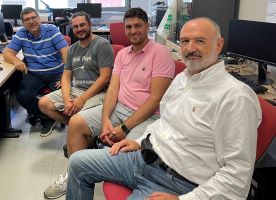
Vasileios Kemerlis, Assistant Professor of Computer Science at Brown University, visited our lab this summer for research collaboration in the context of Greek Diaspora Fellowship Program (GDFP)
Funded by the Stavros Niarchos Foundation and managed by the Institute of International Education in collaboration with the Fulbright Foundation in Greece, the GDFP pairs members of the Greek and Cypriot academic diaspora with higher education institutions and collaborators in Greece to work together on curriculum co-development, collaborative research, graduate and undergraduate research training, and mentoring activities. Fellowships match host universities with scholars and cover the expenses for project visits of between 14 and 90 days, including transportation, a daily stipend, materials allowance, and health insurance.
During the one month visit, Prof. Kemerlis and MMlab researchers investigated solutions for hardening the capabilities-based access control solution for the IoT, proposed by our lab in an IEEE SafeThings 2022 paper. The solution was extended with a new credential verification scheme that leverages a Trusted Execution Environment (TEE), i.e., Intel SGX, to perform the verification process. This amendment hardens the cryptographic computations involved by providing stronger security guarantees (i.e., integrity and secrecy).
A full list of funded projects is available here.
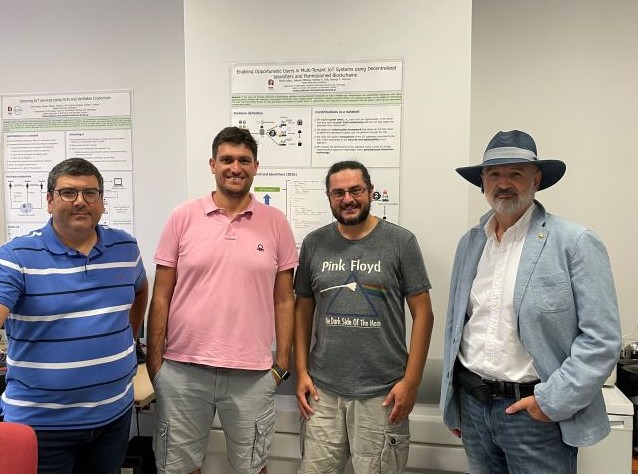
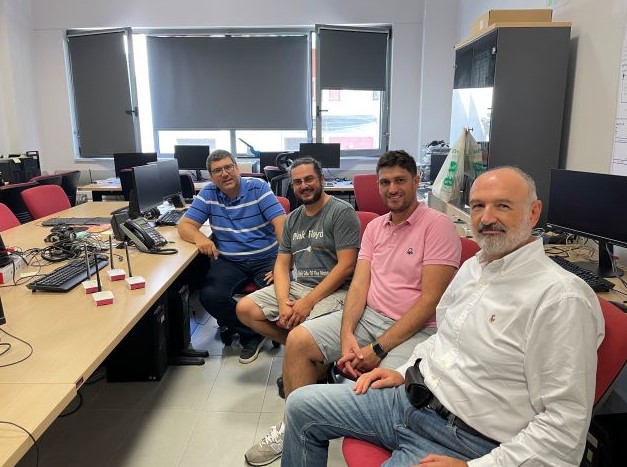
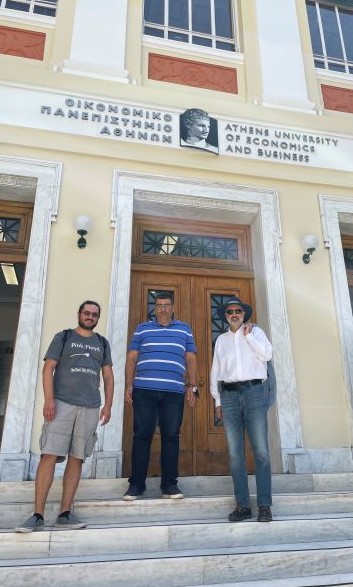
Smartening the IPFS DHT
14-12-2020 One of the main content routing systems of the IPFS architecture is a Distributed Hash Table (DHT). DHTs are well-studied overlay networks that allow key-based lookup in a fully decentralized manner. IPFS leverages a DHT system, implemented using the Kademlia protocol, to provide content lookup: all IPFS nodes "advertise" content items they store in the DHT and this results in a distributed "dictionary" used for looking up content.
One of the main content routing systems of the IPFS architecture is a Distributed Hash Table (DHT). DHTs are well-studied overlay networks that allow key-based lookup in a fully decentralized manner. IPFS leverages a DHT system, implemented using the Kademlia protocol, to provide content lookup: all IPFS nodes "advertise" content items they store in the DHT and this results in a distributed "dictionary" used for looking up content.
Content advertisements and lookups are routed through an overlay network composed of the nodes participating in the DHT. Currently, routing in the overlay network is only based on node identifiers, which are flat, randomly generated numbers. This results in significant "path stretching," i.e., an overlay path between two nodes can be considerably longer than the corresponding underlay IP path. Additionally, IPFS’s DHT is composed of user-managed nodes, i.e., it does not rely on a centralized or single-entity managed infrastructure. Although this gives IPFS intriguing scalability, decentralization, robustness, survivability, security, and privacy properties, it affects network availability since user nodes often experience high "churn" rates, frequently disconnecting from the network. Protocol Labs recently joined forces with the Mobile Multimedia Laboratory at the Athens University of Economics and Business in a project that aims to solve these problems by designing and applying a multilevel DHT design.
The proposed solution will apply the Canon approach in IPFS’s DHT. Canon is a framework for building DHTs that allow node clustering based on the underlay network topology. The novelty of Canon is that it does not propose a new DHT design, instead it builds on existing DHT systems by modifying their routing algorithms. Canon belongs to a class of DHTs known as "horizontal multi-level" DHTs. DHTs of this category have the advantage of not relying on centralized, special-purpose, powerful "super nodes" (also known as super peers). Instead, they equally distribute load across all nodes. Furthermore, horizontal multi-level DHTs do not impose any requirements on node identifiers (as opposed to, for example, "vertical" DHTs, which typically require node identifiers to reflect node hierarchy). This allows flat, random identifiers that can be mapped to public keys, hence offering better security. A multilevel DHT built using Canon has two important performance and security enhancing properties: path locality and convergence of paths exiting a cluster.
The path locality property guarantees that a path between two nodes belonging to the same cluster never leaves that cluster. If node clustering is defined using a network-related metric (e.g., latency) or condition (e.g., geo-location), nodes belonging to the same network domain form a cluster. In that case, path locality results in significant performance and availability improvements: paths between nodes of the same domain will never exit that domain, and, no matter the churn of the external nodes, as long as the nodes of the domain are stable, intra-domain paths will never fail. Similarly, if clustering is defined using a trust metric, path locality increases security since a "local" path will include only equally trusted nodes.
Convergence of paths exiting the cluster guarantees that all paths moving from inside a cluster toward a given destination outside that cluster will always exit the cluster through the same node. This property creates great opportunities for caching as well as for aggregation of requests and responses. Furthermore, these exit nodes are ideal locations for implementing security policies. It should be noted that these exit nodes are not ultimately single points of failure since, if they fail, their role will be automatically assigned to another node of the cluster.
Our joint project, which started in July 2020 with an expected duration of 15 months, is composed of two main phases. In the first phase, we will experiment with various clustering algorithms, bootstrap mechanisms, and deployment strategies through simulations. To this end, we will rely on PeerNet, an event-based P2P simulator extending and relying on the popular PeerSim simulator. During this phase, we will use the simulator to evaluate the two multilevel DHTs resulting from applying the Canon framework to Pastry and Kademlia. Furthermore, we will adapt IPFS protocols to take advantage of the hierarchical DHT properties.
During the second phase of the project, we will extend the libp2p library, which underpins IPFS and related systems, to include a multi-level DHT implementation, as well as auxiliary tools. Our implementation, which will be made available as a free, open-source project, will be used for experimenting with the IPFS protocol stack and for designing a hassle-free migration strategy.
We expect this to be a fun, promising project, and we anticipate that it will contribute to the improvement of the performance and security of IPFS. We also anticipate that a multi-level DHT design will be able to support novel applications by providing service-level guarantees.
SCN4NDN: University of Memphis and our lab join forces in an NGI-Atlantic funded project
04-12-2020 The Self-Certifying Names for Named Data Networking (SCN4NDN) project will perform extensive experiments to validate and evaluate the application of Decentalized Identifiers (DIDs) to the Information-Centric Networking (ICN) paradigm. ICN's goal is to enable fast and secure content dissemination by leveraging multicast, multipath, and caching, and by using novel trust mechanisms. One predominant ICN architecture is the Named Data Networking (NDN). NDN, and many other similar architectures, use digital signatures to protect content integrity and authenticity. A digital certificate is used for binding the signing key with the content name. In this project we replace this approach and we use DIDs instead. Using DIDs, content names become decentralized, owner-independent, and self-certifying, in the sense that a user can verify the authenticity and the integrity of a content item, by relying only on the content name and the content item itself, removing the need for trust anchors, or any other middlemen.
The Self-Certifying Names for Named Data Networking (SCN4NDN) project will perform extensive experiments to validate and evaluate the application of Decentalized Identifiers (DIDs) to the Information-Centric Networking (ICN) paradigm. ICN's goal is to enable fast and secure content dissemination by leveraging multicast, multipath, and caching, and by using novel trust mechanisms. One predominant ICN architecture is the Named Data Networking (NDN). NDN, and many other similar architectures, use digital signatures to protect content integrity and authenticity. A digital certificate is used for binding the signing key with the content name. In this project we replace this approach and we use DIDs instead. Using DIDs, content names become decentralized, owner-independent, and self-certifying, in the sense that a user can verify the authenticity and the integrity of a content item, by relying only on the content name and the content item itself, removing the need for trust anchors, or any other middlemen.
The experiments will be undertaken over the NDN testbed and other specialized experimental infrastructure. The project is a collaboration between the University of Memphis in the USA and our lab, and it is funded by NGIatlantic.eu. For more information visit the project's home page
Prof. George C. Polyzos at the "1st BEST-NEST Invitational Workshop on New Paradigms in Intelligent Spectrum Management and Regulation Future Directions, Technologies, Standards and Application"
02-12-2020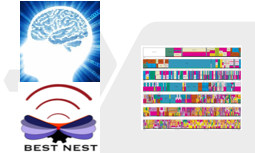 Prof. George C. Polyzos will participate at the " Economy and Business Development for Spectrum Sharing" panel of the "1st BEST-NEST Invitational Workshop on New Paradigms in Intelligent Spectrum Management and Regulation Future Directions, Technologies, Standards and Application". The workshop will take place on December 3rd. More information about this event can be found here.
Prof. George C. Polyzos will participate at the " Economy and Business Development for Spectrum Sharing" panel of the "1st BEST-NEST Invitational Workshop on New Paradigms in Intelligent Spectrum Management and Regulation Future Directions, Technologies, Standards and Application". The workshop will take place on December 3rd. More information about this event can be found here.Research position on sharing economy platforms and crowdsourced network infrastructures and services
11-09-2020
We have oneopen research positions in the context of a Hellenic Foundation for Research and Innovation (HFRI) grant (CRESCENDO project). The starting date for the appointment will be anytime in the interval October-December 2020 and its duration will be one year. The hired researcher will work in one or more of three thematic areas, which in order of priority are:
- Sharing economy platforms, with emphasis on transportation applications, e.g., ride-sharing and smart parking platforms
- Shared network infrastructures
- Participatory sensing and mobile crowdsensing
Eligible for the positions are
- Holders of an MSc degree in the field of Electrical and Computer Engineering, Informatics/Computer Science, Mathematics, or other related subject
- Current PhD students, who might want to work in one of the three areas as part of, or even independently of, their PhD work
- Young postdoctoral researchers with prior expertise and/or interest in one or more of the three areas
Applicants should have proficient knowledge of the English language and good technical writing and communication skills. Prior experience with mathematic software packages such as MATLAB and analytical skills in any of the areas of queuing theory, game theory, optimization, algorithms will be assessed positively. Equally welcome is possible experience with data mining and analysis of large datasets.
The researchers will join the Mobile and Multimedia Lab (https://mm.aueb.gr) of the Department of Informatics, in the Athens University of Economics and Business (AUEB). The Lab is housed in the new building of AUEB, possesses excellent computational resources, and hosts one of the largest and strongest teams across Greece in the area of networking. The monthly salary will be according to the provisions of HFRI for these grants, which make allowance for added value tax and mandatory insurance expenses on the employer's side
Interested applicants should send an email expressing their interest and addressing their questions to Dr. Merkouris Karaliopoulos (mkaralio@aueb.gr) with subject line "CRESCENDO project positions" and an attached cv, by September 21st, 2020
Evaluating the Quality of Experience in Network Music Performance
20-04-2020
MMLab member Konstantinos Tsioutas (Ph.D. Candidate) will present his work on Quality of Experience (QoE) evaluation for Network Music Performance (NMP) at the 148th Audio Engineering Society Conference.
In NMP, audio quality and audio delay are considered to be the most critical variables affecting the QoE. Although past work in the field has evaluated the effects of delay on remote musician synchronization, it has assumed high speed network connectivity and sophisticated equipment available only to research labs. The work of Konstantinos Tsioutas not only focuses on the equipment and speeds available to home users via high speed residential network connections but, more importantly, it uses user-centric QoE evaluation tools and methodologies to assess various parameters of the musicians' experience in NMP sessions. The paper to be presented at the AES Conference reports on a pilot study where eight musicians performed music in pairs in a controlled NMP setting and were asked to evaluate eight variables related to perception, while the end-to-end delay and the quality of the exchanged audio were varied.
Talk by Pavlos Nikolopoulos
11-02-2020
Pavlos Nikolopoulos who is currently a postdoctoral researcher in Computer & Communication Sciences working with the NAL lab at EPFL and the ARNI lab at UCLA, will give a talk on "Traffic receipts for network transparency" on Tuesday, February 18th, at room 414 of the Trias str. building of the Athens University of Economics and Business (AUEB)
Talk abstract: Today's Internet is not transparent: when packets get lost or delayed, there is typically no information about where the problem occurred, hence no information about who is responsible. This results in Internet service providers (ISPs) offering service level agreements (SLAs) that cannot be verified, and governments enacting neutrality regulations that cannot be enforced. To remedy this, we propose a "network transparency system," where each participating network emits receipts for a small sample of packets it observes; an independent monitor collects these receipts and makes decisions regarding the network’s performance and neutrality (or lack thereof). Sampling is a good building block for this system, because it enables a solution that is flexible and combines low resource cost with quantifiable accuracy. The challenge we face is misbehavior: a network that participates in such a system has a clear incentive to game the system and influence the monitor’s decisions to its advantage, by manipulating either the receipts it emits or the corresponding sampled traffic. In this talk, I will present a new packet-sampling algorithm that is provably robust to such misbehavior, enables network-performance estimation with quantifiable accuracy, and requires only minimal resources.
Presenter's biography: Pavlos Nikolopoulos is a postdoctoral researcher in Computer & Communication Sciences working with the NAL lab at EPFL and the ARNI lab at UCLA. His main research interests lie at the intersection of network security, system design and statistics, with a focus on Network Transparency and Blockchain systems. He received his PhD from EPFL under the supervision of Professor Katerina Argyraki, and his MSc in Informatics & Telecommunications from the University of Athens, Greece. Before starting at EPFL in 2012, he worked for several years as a telecom engineer for the Greek Air Force.
Talk by Constantinos Patsakis
16-12-2019
Constantinos Patsakis who is currently an assistant professor at the department of informatics in the University of Piraeus, will give a talk on "Blockchain DNS: A solution with several threats" on Tuesday, December 17th, at room 414 of the Trias str. building of the Athens University of Economics and Business (AUEB)
Talk abstract: In the past years, a core Internet infrastructure, domain name system (DNS), is being revised mainly due to its inherent security and privacy issues. One of the proposed solutions is Blockchain-based DNS, which claims to solve many issues of traditional DNS. However, this does not come without security concerns and issues, as any introduction and adoption of a new technology does - let alone a disruptive one such as blockchain. In this talk, we introduce the basic concepts behind Blockchain DNS and discuss a number of associated threats, including emerging ones, and we validate many of them with real-world data..
InterConnect meeting in Athens
10-12-2019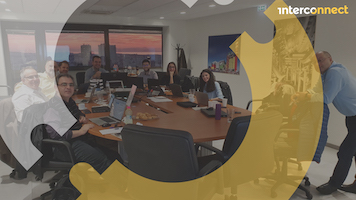
MMlab members participated in InterConnect meeting in Athens.
Greek partners GRIDNET, HERON, COSMOTE, WINGS and AUEB and also Maria Perez Ortega from GFi (Belgium), met last week in Athens. The partners took the opportunity to set up the basis for collaboration between all in the activities of the Greek pilot
MMlab @ Decentralized 2019
01-11-2019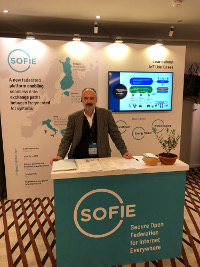
MMlab and the SOFIE project participated in Decentralized 2019
G. Polyzos moderated SOFIE workshop that took place during the Decentralized 2019 conference. The conference attendants had also the chance to learn more about SOFIE at the project's booth.
CFP: Decentralized IoT Systems and Security (DISS 2020)
29-10-2019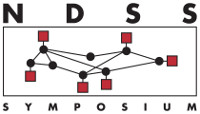
Call for Papers
Decentralized IoT Systems and Security (DISS 2020)
A workshop in conjunction with NDSS 2020
February 23, 2020 — San Diego, CA
Organizers:
- Farinaz Koushanfar, UCSD, USA (fkoushanfar@eng.ucsd.edu)
- Pekka Nikander, Aalto University, FI (pekka.nikander@aalto.fi)
- George C. Polyzos, AUEB, GR (polyzos@acm.org)
- Vasilios A. Siris, AUEB, GR (vsiris@aueb.gr)
An open full-day workshop with extensive discussion. It is the 3rd in a series with NDSS. Revised papers will be published as post-workshop proceedings by the Internet Society.
Technical summary
The success of the Internet of Things (IoT) depends significantly on solving related decentralization, security and privacy challenges. A key aspect is decentralization, as many if not most of the IoT use cases include big data collection from large-scale and heterogeneous device deployments. Furthermore, decentralized security may help to overcome privacy concerns and scalability bottlenecks, both of which become increasingly serious in large-scale deployments, such as smart cities, Industry 4.0, or next generation business platforms.
A decentralized approach to IoT systems and security brings forth many opportunities but also challenges, such as operating with constrained devices, with intermittent network connectivity, state synchronization, and trust management — these and additional challenges listed below would be the scope of the proposed workshop.
Following the spirit of NDSS, the goal of this workshop is to bring together academia and industry, researchers and practitioners, to analyze and discuss the potential and limits of decentralization in secure IoT systems.
The proposed topics include the following (but we will not reject relevant papers not falling under these topics):
- Secure interoperability across IoT ecosystems
- Security and privacy trade-offs related to IoT scalability and decentralization
- Securing the Web of Things
- Secure service provisioning and software upgrading for large-scale IoT
- Self-awareness and self-adaptation in decentralized IoT
- Usable and context-aware security for decentralized IoT
- Peer-to-Peer (P2P) security and privacy in IoT
- Blockchains and other Distributed Ledger Technologies for secure and trusted interaction in the IoT and edge systems
- Security and privacy in multi-tiered edge systems ("fog computing")
- Smart Contracts for the IoT, including formal verification of smart contracts
- Decentralized access control and rights management
- Decentralized trust management and governance
- Authentication and access management at the IoT edge
- IoT security and privacy architectures for 5G Networks
- IoT Key Management Protocols
- Trust, Security, Safety, and Privacy in IoT-enabled tactile and critical infrastructures
- Scalable programmable network infrastructures for supporting secure IoT applications
- NFV, Management & Orchestration for distributed, scalable and secure IoT architectures
- Decentralized (edge & backend) IoT analytics and embedded intelligence
- Application of concepts from outside of the IoT to decentralized IoT security
- Security & Privacy for Federated/Distributed Machine Learning with Adversarial Agents
- Attestation in the large scale decentralized IoT
Submission Instructions
The workshop will accept papers of between four to six pages in length for publication in post-workshop proceedings. Proceedings will be published by the Internet Society with the revised papers based on the workshop discussions and reviewer comments.
Papers shall be submitted for review in print-ready form using the NDSS paper template and the review will be single blind. For a paper to be published, at least one of the authors must attend the entire workshop, the paper must be revised based on the discussion at the workshop, and the revised paper must be submitted in time for the publication deadline.
As previously, submissions and reviews will be handled by EasyChair. PC members have been invited and will be announced soon.
Important dates
Abstract submission:
Paper Submissions Due:
Decision Notice to Authors: January 17, 2020
Camera-ready paper: March 13, 2020
MMLab @ ACM Mobihoc 2019
02-09-2019
The Lab participated in ACM Mobihoc 2019 with two papers, one regular and one poster
I. Koutsopoulos presented the paper "Tile-based Caching Optimization for 360-degree Videos", co-authored by G. Papaioannou and himself, during the conference main program. M. Karaliopoulos presented the paper "Infrastructure and service provider games in crowdsourced networks", co-authored by himself and I. Koutsopoulos, during the poster session. Both papers can be downloaded through the program pages of the conference.
Best paper award
01-06-2019
Members of Teaching and Research Staff of AUEB's Department of Informatics received a Best Paper Award at the IEEE workshop on Economics of Fog, Edge and Cloud Computing (ECOFEC) 2019, in conjunction with IEEE INFOCOM, a conference for communications and computer systems, held in Paris from 28 April to 2 May 2019.
The paper that won the award is entitled "Economics of Investment and Use of Shared Network Infrastructures" and is co-authored by Iordanis Koutsopoulos (Associate Professor of the Department of Informatics and member of MMlab), Aggeliki Anastopoulou (PhD Candidate and member of STEcon lab) and Merkourios Karaliopoulos (postdoctoral researcher and member of MMlab).
The work deals with innovative mathematical models and economic mechanisms on how different entities (such as service providers) can invest and cooperatively build a telecommunications network infrastructure, which they can then use together to deploy services. In particular, the work demonstrates that if a network coordinator allocates to the entities the overall benefit from provisioned services in a specific way, then the entities’ selfish behavior on how they invest in the ends up in the same investment policy as the one resulting from full cooperation of the entities. This result shows that this profit allocation mechanism may be generalized and used as a means to eliminate selfish behaviors and to align them towards common interest.
Research positions available
31-05-2019
We have two open research positions in the context of a Hellenic Foundation for Research and Innovation (HFRI) grant (CRESCENDO project). Starting date for the appointments is October 2019. The hired researchers will work in one or more of the following three areas:
- shared network infrastructures
- participatory sensing and mobile crowdsensing
- sharing economy platforms, with emphasis on transportation applications e.g., ride-sharing and smart parking platforms
Eligible for the positions are holders of an MSc degree in the field of Electrical and Computer Engineering, Informatics/Computer Science, Mathematics, or other related subject; current PhD students, who might want to work in one of the three areas as part of, or even independently of, their PhD work; young postdoctoral researchers with prior expertise and/or interest in one or more of the three areas.
Applicants should have proficient knowledge of the English language and good technical writing and communication skills. Prior experience with mathematic software packages such as MATLAB and analytical skills in any of the areas of queuing theory, game theory, optimization, algorithms will be assessed positively. Equally welcome is possible experience with data mining and analysis of large datasets.
The researchers will join the Mobile and Multimedia Lab (https://mm.aueb.gr) of the Department of Informatics, in the Athens University of Economics and Business (AUEB). The Lab is housed in the new building of AUEB, possesses excellent computational resources, and hosts one of the largest and strongest teams across Greece in the area of networking. The monthly salary will be according to the provisions of HFRI for these grants, which make allowance for added value tax and mandatory insurance expenses on the employer's side
Interested applicants should send an email expressing their interest and addressing their questions to Dr. Merkouris Karaliopoulos (mkaralio@aueb.gr) with subject line "CRESCENDO project positions" and an attached cv, by June 30th, 2019
Paper presentation at INFOCOM CryBlock workshop
24-05-2019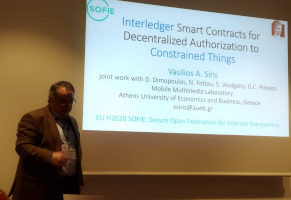
Vasilios Siris presented AUEB's work on interledger smart contracts for decentralized authorization in constrained IoT environments, which was funded by H2020 project SOFIE (Secure Open Federation for Internet Everywhere), at the 2nd Workshop on Cryptocurrencies and Blockchains for Distributed Systems (CryBlock 2019), co-located with IEEE INFOCOM 2019, April 29th, 2019, Paris, France.)
You can download the paper by clicking here
Talk by Ioannis Psaras
15-04-2019
Ioannis Psaras who is currently an EPSRC Fellow (2015-2020) and Lecturer with the E&EE Dept. at UCL, London, will give a talk on "Decentralised Edge Computing through Distributed Trust" on Tuesday, April 16th, at room 414 of the Trias Str. building of the Athens University of Economics and Business (AUEB)
Talk abstract: The Internet world is turning upside-down. In today's Internet, data is primarily flowing from data-centre servers and server farms, placed largely at the core of the network, towards the users at the edge of the network. In tomorrow's Internet, data will (primarily) be produced at the edge of the network from IoT devices, smart/autonomous vehicles, wearables, sensors and the like. This data will be of enormous volume. It has been said that each autonomous vehicle could generate tens of TBs of data per hour. The current Internet infrastructure is not prepared to accommodate this volume of data coming in from the edge. The current model of sending everything back to the cloud for processing will simply not cope with this wave of data coming from the edge. In order to get the Internet infrastructure prepared for this change, there are a number of components that need to be smoothly integrated into the current Internet architecture. At UCL, we are building solutions to address the needs of a future, privacy-preserving, IoT-dominated edge computing environment.
Talk by Vach Kompella
03-04-2019
Dr. Vach Kompella, Vice President, Mobile Gateway R&D, Nokia (based in the Bay Area/Silicon Valley) will give a talk on Thu 4/4/2019, 16:30-18:00 in E710 (Evelpidon 47A, 7th floor)
An informal discussion will follow
Best paper award
07-01-2019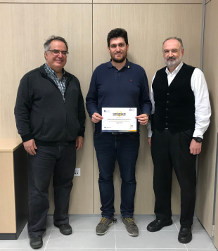
Our paper won the best paper award at the 7th International Symposium on Security and Privacy on Internet of Things (SPIoT).
The symposium took place in conjunction with the 11th International Conference on Security, Privacy and Anonymity in Computation, Communication and Storage (SpaCCS), Melbourne, Australia, December 2018. The paper, titled "Interacting with the Internet of Things Using Smart Contracts and Blockchain Technologies", presented how constrained IoT devices can be used with the blockchain technology. This is a joint work by N. Fotiou, V. A. Siris, and G.C. Polyzos from MMLab, funded by the SOFIE project. The paper is published in Lecture Notes in Computer Science, vol. 11342, pp. 443-452.
You can find more details in our paper in this link.
Business idea award
22-11-2018
MMlab PhD candidate Andreas Papidas, with his One Connect team, won the 3rd prize in the 8th AUEB Innovation and Entrepreneurship contest
The team made a proposal, mockup and business plan regarding automatic bicycle accident warning and tracking using LoRaWAN IoT technologies.
Talk by Christos Bampis
15-10-2018
Christos Bampis, who is currently a phd student at at the University of Texas at Austin, will give a talk on user quality of experience in video streaming applications
Talk abstract: Large-scale video streaming on demand has become possible thanks to numerous engineering achievements in fields such as video compression, high-speed computation and display technologies. Nevertheless, the skyrocketing needs for bandwidth and network resources consumed by video applications challenges modern video content delivery. Since the available bandwidth resources are limited, streaming service providers have to mediate between operation costs, bandwidth efficiency and maximizing user quality of experience. However, these goals are inherently conflicting and require knowledge of how user quality of experience is affected by the network-induced changes in video quality. Being able to understand and predict user quality of experience and perceptually optimize rate allocation, can have significant effects in better network utilization, reduced costs for service providers and improved user satisfaction. In this talk, we will discuss on subjective and objective approaches to study and predict user quality of experience in video streaming applications, by exploiting perceptual video quality and human behavioral responses to streaming-related video impairments.
Presenter's biography: Christos Bampis graduated from the ECE school at the National Technical University of Athens in 2014. He then received a PhD in Electrical Engineering from the University of Texas at Austin in 2018. His research interests span various research areas in image and video quality, quality of experience, image processing and computer vision. He recently started working as a software engineer at the Video Algorithms team at Netflix, focusing on perceptual video quality and quality of experience prediction algorithms.